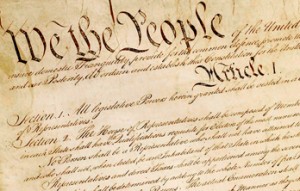ADEQ Warrantless Searches!

Act 1076 of 1991 must be repealed! Read the bill below; the devil is in the details.
The Arkansas Department of Environmental Quality (ADEQ) performs searches with NO search warrant! This should concern you, as well as every city and county!
If consent to inspect is denied, the ADEQ may obtain an administrative inspection warrant from a judicial officer.
If a property owner refuses ADEQ inspection, the property owner is subject to a $25,000 fine. See Arkansas Code (A.C.A.) § 8-1-107 (F) in Arkansas Code below.
SB517 / ACT1076 PROVIDE PROCEDURES FOR ADMINISTRATIVE SEARCHES BY DEPARTMENT OF POLLUTION CONTROL AND ECOLOGY PERSONNEL
AN ACT TO AMEND TITLE EIGHT, CHAPTER ONE OF THE ARKANSAS CODE ANNOTATED OF 1987 TO PROVIDE PROCEDURES FOR ADMINISTRATIVE SEARCHES BY DEPARTMENT OF POLLUTION CONTROL AND ECOLOGY PERSONNEL, FOR THE ISSUANCE OF ADMINISTRATIVE SEARCHES WARRANTS TO THE ARKANSAS DEPARTMENT OF POLLUTION CONTROL AND ECOLOGY; AND FOR OTHER PURPOSES.”
SB517 was sponsored by Senator Pagan in the 78th General Assembly. This bill passed both the house and senate and was signed into law on April 9, 1991 by Governor Jim Guy Tucker. This bill became Act 1076.
Act 1076 allows the Arkansas Department of Environmental Quality (ADEQ) to perform unconstitutional, warrantless searches. If consent to inspect is denied, the department may obtain an administrative inspection warrant from a judicial officer. Any willful and unjustified refusal of right of entry and inspection to department personnel shall constitute a misdemeanor subject to a fine of up to twenty-five thousand dollars ($ 25,000) or civil penalties up to twenty-five thousand dollars ($ 25,000). This penalty is listed in the Arkansas code at § 8-1-107 section (f).
Act 1076 violates both the U.S. Constitution and Arkansas State Constitution and must be repealed…
Why is ADEQ above the law and not required to get a warrant just like the Law Enforcement Officers (LEO)?
U.S. Constitution Bill_of_Rights, Article IV: The right of the people to be secure in their persons, houses, papers, and effects, against unreasonable searches and seizures, shall not be violated, and no warrants shall issue, but upon probable cause, supported by Oath or Affirmation, and particularly describing the place to be searched, and the persons or things to be seized.
Arkansas_Constitution Article 2 § 15: The right of the people of this State to be secure in their persons, houses, papers, and effects, against unreasonable searches and seizures, shall not be violated; and no warrant shall issue, except upon probable cause, supported by oath or affirmation, and particularly describing the place to be searched, and the person or thing to be seized.
Shown below is the wording of the Arkansas Code Annotated for A.C.A. § 8-1-107 that gives Arkansas Department of Environmental Quality (ADEQ) the unconstitutional power without a search warrant. http://www.lexisnexis.com/
==================== Start of A.C.A. § 8-1-107 ====================
Title 8 Environmental Law
Chapter 1 General Provisions
Subchapter 1 General Provisions
A.C.A. § 8-1-107 (2015)
8-1-107. Inspections — Definitions — Investigations — Inspection warrant — Exceptions — Penalties.
(a) General.
Whenever it shall be necessary for the purpose of implementing or monitoring the enforcement of any law charged to the authority of the Arkansas Department of Environmental Quality, any authorized employee or agent of the department may enter upon any public or private property for the purpose of obtaining information or conducting investigations or inspections, subject to the following provisions.
(b) Definitions.
As used in this section, the following terms shall have these ascribed meanings:
(1) “Administrative inspections” means investigation by department personnel at facilities operating within the department’s apparent regulatory jurisdiction;
(2) “Facility” means the public or private area, premises, curtilage, building, or conveyance described as the subject of administrative inspection;
(3) “Pervasively regulated facility or activity” means the activity or facility that is the location of activity authorized by the department through a permit, license, certification, or operational status approval; and
(4) (A) “Probable cause” means showing that an administrative search limited in scope is necessary to ensure compliance with or enforcement of laws, regulations, or orders charged to the department for implementation.
(B) For the purpose of conducting administrative inspections or applying for administrative warrants, probable cause may be provided to the department through complaints or other means that reasonably justify a limited and controlled administrative inspection.
(c) Administrative Inspections.
(1) (A) Whenever the department obtains information that supports reasonable cause to believe that a violation of any law within its regulatory authority is being or has been violated, or that unauthorized regulated conduct is occurring or has occurred, department personnel or its agents may demand entry onto any property, public or private, to inspect any facility.
(B) The department’s investigation or inspection shall be limited to that necessary to confirm or deny the cause which prompted the investigation or inspection, and shall be conducted during daylight, during regular business hours, or, under emergency or extraordinary circumstances, at a time necessary to observe the suspected violation or unauthorized conduct.
(C) Except under emergency circumstances, the department shall inform such facility’s owner or agent of all information which forms the basis of its probable cause at the time of the inspection.
(2) Nothing in this subsection shall be construed as requiring the department to forfeit the element of surprise in its inspection efforts.
(3) Also, nothing in this section shall be construed as limiting the frequency of the periodic or random inspections of pervasively regulated facilities or activities.
(4) For the purpose of this section, a rebuttable presumption concerning the jurisdiction of the department’s regulatory authority is established as it regards the department’s authority to inspect any facility.
(d) Administrative Warrants.
If consent to inspect is denied, the department may obtain an administrative inspection warrant from a judicial officer. Issuance and execution of administrative inspection warrants shall be as follows:
(1) Any judicial officer otherwise authorized to issue search warrants within his or her jurisdiction may, upon proper oath or affirmation showing probable cause as defined by this section, issue warrants for the purpose of conducting administrative inspections authorized by any law or regulation administered by the department;
(2) A warrant shall issue only upon an affidavit of a department official, employee, or agent having knowledge of the facts alleged, sworn to before the judge or magistrate and establishing the grounds for issuing the warrant. If the judge or magistrate is satisfied that grounds for the application exist or that there is probable cause to believe they exist, he or she shall issue a warrant identifying the facility to be inspected, and the purpose of the inspection. The warrant shall:
(A) State the grounds for its issuance and the name of each person whose affidavit has been taken in support thereof;
(B) Be directed to a department officer or employee;
(C) Command the person to whom it is directed to inspect the area, premises, building, or conveyance identified for the purpose specified;
(D) Specifically identify any documents or samples to be gathered during the inspection;
(E) Direct that it be served during normal business hours unless emergency or extraordinary circumstances compel otherwise; and
(F) Designate the judge or magistrate to whom it shall be returned;
(3) If appropriate, the warrant may authorize the review and copying of documents which may be relevant to the purpose of the inspection. If documents must be seized for the purpose of copying, the person serving the warrant shall prepare an inventory of documents taken. The inventory shall be made in the presence of the person executing the warrant and of the person from whose possession or facility the documents were taken, if present, or in the presence of at least one (1) credible person other than the person executing the warrant. A copy of the inventory shall be delivered to the person from whom or from whose facility the documents were taken. The seized documents shall be copied as soon as feasible under circumstances preserving their authenticity, then returned to the person from whom the documents were taken;
(4) The warrant may authorize the taking of samples of materials generated, stored, or treated at the facility, or of the water, air, or soils within the facility’s control or that may have been affected by the facility’s operations. The person executing the warrant shall prepare an inventory of all samples taken. In any inspection conducted pursuant to an administrative warrant in which such samples are taken, the department shall make split samples available to the person whose facility is being inspected;
(5) A warrant issued pursuant to this section must be executed and returned within ten (10) days of its date unless, upon a showing of a need for additional time, the court orders otherwise. The return of the warrant shall be made promptly, accompanied by a written inventory of any documents or samples taken;
(6) The judge or magistrate who has issued a warrant shall attach thereto a copy of the return and all papers returnable in connection therewith and file them with the clerk of the circuit court for the judicial district in which the inspection was made;
(7) This subsection does not prevent the inspection without a warrant of books and records pursuant to an administrative subpoena issued in accordance with duly adopted administrative procedures; and
(8) A copy of the warrant and all supporting affidavits shall be provided to the person served, or left at the entry of the facility inspected.
(e) Administrative Warrants — Exceptions.
Notwithstanding the previous subsection, an administrative warrant shall not be required for any inspection, including the review and copying of documents and taking of samples, under the following circumstances:
(1) For pervasively regulated facilities or activities as defined by this section whose permit, license, certification, or operational approval from the department provides notice that the department may inspect regulated activities to assure compliance. If the department has reason to believe that a violation of any law has or is occurring, the basis for such belief shall be communicated at the time of the inspection;
(2) If the owner, operator, or agent in charge of the facility consents;
(3) In situations presenting imminent danger to public health and safety or the environment;
(4) In situations involving inspection of conveyances, if there is reasonable cause to believe that the mobility of the conveyance makes it impracticable to obtain a warrant;
(5) In any other exception or emergency circumstance when time or opportunity to apply for a warrant is lacking;
(6) In situations involving conditions that may be observed in an open field, from an area practically open to public access, or in plain view; or
(7) In all other situations in which a warrant is not constitutionally required.
(f) Penalties.
Any willful and unjustified refusal of right of entry and inspection to department personnel as set out in this section shall constitute a misdemeanor subject to a fine of up to twenty-five thousand dollars ($ 25,000) or civil penalties up to twenty-five thousand dollars ($ 25,000).
HISTORY: Acts 1991, No. 1076, § 2.
====================== End of A.C.A. § 8-1-107 =========================
[Yellow highlight and bold emphasis by Secure Arkansas]
This is the committee Secure Arkansas thinks the legislation would have to go through to get it repealed:
|
|||||||||||||||||||||||||||||||||||||||
|
||||||||||||
|
||||||||||||||||||||||||||||||||||||||||||||||||||||||||||||||||
Let’s keep Arkansas from becoming a police state.
Act 1076 of 1991 must be repealed.
Be sure to forward this email to your family and friends!
They may also sign up to receive our Action Alerts by clicking here.
Securing the blessings of liberty,
Secure Arkansas
securetherepublic.com/arkansas
info@securetherepublic.com
